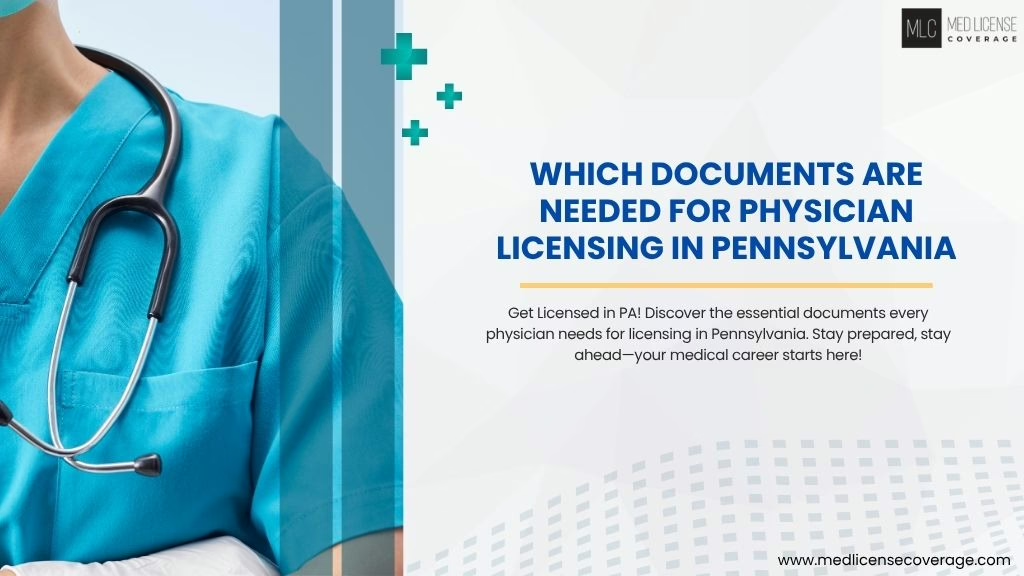Physician licensing in Pennsylvania ensures that only qualified and verified professionals can practice medicine in the state. To meet the State Board’s requirements, physicians must submit specific documents ranging from identity proof to education records. Missing or outdated files can lead to serious delays or even license denial.
This overview describes the essential documents for physician licensing in Pennsylvania. It additionally highlights the support provided by medical licensing solutions and the steps required for physician license renewal.
Summary of Physician Licensing in Pennsylvania
In Pennsylvania, Physicians must meet rigorous licensing requirements. The State Board of Medication or Osteopathic Medicine manages these requirements. Before practicing, all medical professionals must send verified paperwork. These records should satisfy board guidelines.
The licensing process assesses education and learning, training, identification, work history, and legal background. Many experts turn to medical licensing solutions to handle the documents. These services decrease delays and mistakes. Exact documents and appropriate formatting aid certain faster approvals.
Listing of Required Records
Below is an in-depth breakdown of records needed for Physician licensing in Pennsylvania.
1. Medical Degree Certificate
A medical degree certificate is required. It verifies graduation from an accredited medical school. The school should be identified by a validated approving body. The document needs to include:
- Name of the institution
- Degree awarded
- Date of graduation
- Unrecognized medical schools or incomplete programs will cause disqualification.
2. Postgraduate Training Confirmation
Residency or fellowship training is important. Candidates have to reveal proof of completing at least one year of postgraduate training in an authorised program. Appropriate files consist of
Certification of completion
- Evaluation forms or records
- Verification letters from program supervisors
- Insufficient or unproven training will not meet licensing criteria.
3. Proof of Identity
Government-issued photo ID is needed. Appropriate files include:
- Passport
- Driver’s license
- State-issued ID
The name must be consistent across all submitted documents and forms. Inconsistencies may delay handling.
4. Employment Background
A full employment history is necessary. This consists of:
- Previous hospitals or clinics
- Positions held
- Days of work
Any employment gaps must be discussed. Clear timelines help verify constant expert tasks.
5. Certificate History from Other States
Medical professionals with licenses in Other States must send a license verification. This file needs to come straight from the releasing board. It validates:
- License status
- Issue and expiration dates
- Any disciplinary action must be disclosed.
Confirmations need to be recent and sent out straight to the Pennsylvania board.
6. Criminal Background Check
A full background check is required. This process includes fingerprinting and consent forms. All applicants need to pass state and federal testing. Any pending legal matters or previous convictions must be revealed.
Medical licensing services help with fingerprinting, documentation submission, and follow-up with police.
7. Exam Scores
All physicians need to send examination scores from among the following:
- USMLE.
- COMLEX.
- NBME.
- NBOME.
Passing scores need to satisfy the board’s standards. Test outcomes need to come straight from the testing authority.
8. Negligence Case Background
Physicians need to disclose any previous malpractice claims. Required documents include:
- Summaries of previous claims are required.
- Last negotiations.
- Letters from malpractice insurance carriers.
- Openness ensures trust funds and assists in avoiding licensing hold-ups.
9. Continuing Medical Education and Learning (CME)
Some applications require current CME documents. These confirm ongoing education and skill advancement. Paperwork has to consist of
- Course title.
- Completion date.
- Provider name.
- Number of CME hours earned.
The State Board may ask for CME hours throughout license renewal or reinstatement.
10. Reference Letters
In many cases, recommendations are requested. These come from expert peers or managers. Letters must explain:
- Clinical competence.
- Professional conduct.
- Communication skills.
- All letters have to be signed and printed on official letterhead.
11. Declaration of Great Moral Personality
An authorized statement relating to ethical conduct might be Required. This confirms the physician’s professional ethics and integrity. Some boards require this type to be notarised.
Digital Submission Layout
Many Physician licensing Pennsylvania files are submitted online. Files need to be:
- Clear and readable.
- The files should be in approved formats such as PDF or JPEG.
- Called correctly.
Medical Licensing Services make certain each document satisfies entry standards.
Role of Medical Licensing Services
Medical licensing solutions guide professionals via each step. These solutions make certain each paper is:
- Total.
- Validated.
- Sent in a timely manner.
This minimises delays and mistakes. Professionals take care of communication with boards, conserving time. Such support becomes essential during complex entries or renewals.
Physician License Renewal
Physician license renewal is a routine requirement. Renewal files consist of:
- The renewal files must include updated identification proof.
- The renewal files also include evidence of ongoing continuing medical education.
- The individual must maintain a clean disciplinary record.
- Updated work history.
Renewal deadlines must be met to avoid late fees or license suspension. Medical Licensing Services help track deadlines and document updates precisely.
State-Specific Needs
Pennsylvania may request additional documents depending upon a medical professional’s background. This can include:
- Documents related to immigration status may be required.
- Military discharge documents may also be required.
- Ensure you have specialized training certificates.
These should be sent as per board instructions.
Usual Mistakes to Avoid
Mistakes that delay medical professional licensing in Pennsylvania:
- Submitting expired documents.
- Misspelled names.
- Incorrect license numbers.
- Missing test records.
- Blurry or unclear scans.
Avoiding these errors improves processing time and approval rates.
Tracking and Last Evaluation
The board evaluates files after entry. Tracking devices might be offered through Medical Licensing Services. These tools:
- Alert about missing documents.
- Provide status updates.
- Track approvals in real time.
final license issuance depends on the board’s approval timeline.
Conclusion
Physician licensing in Pennsylvania calls for rigorous paperwork. Each record supports eligibility, security, and professionalism and reliability. From medical degree proof to history checks, every file is issued. Medical licensing solutions offer organised assistance throughout the procedure. Physician license renewal also requires prompt, accurate documents. With proper planning, the licensing process becomes smooth and successful.







